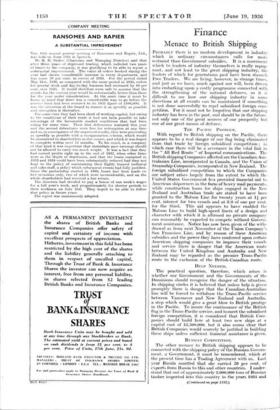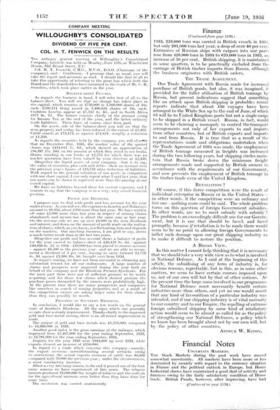Menace to British Shipping
Finance
PROBABLY there is no modern development in industry which in ordinary circumstances calls for more restraint than Government subsidies. It is a movement which to leaders of industry themselves is really repug- nant, and not least to the great shipping industry, the leaders of which for generations past have been staunch Free Traders. We arc living, however, in strange times, and just as we have, much against our will, been driven into embarking upon a 'costly programme connected with the strengthening of the national defences, so it is difficult to see how our shipping industry in some directions at all events can be maintained if something is not done successfully to repel subsidised foreign com- petition. For it must not be forgotten that our shipping industry has been in the past, and should be in the future. not only one of the great sources of our prosperity but one of our great means of defence.
THE PACIFIC PROBLENt.
With regard to British shipping on the Pacific, there appears to be a real danger of our flag being eliminated from that trade by foreign subsidised competition ; in which case there will be a severance in the vital link in the " All Red Route " of Imperial communications. The British shipping Companies affected are the Canadian-Aus- tralasian Line, incorporated in Canada, and the Union of Steamship Companies, incorporated in New Zealand. The foreign subsidised competition to which the Companies are subject arises largely from the extent to which the United States Government has provided financial aid to American shipowners in the form of heavy mail payments, while construction loans for ships engaged in the New Zealand and Australian trade are stated to have been granted to the Matson Line for twenty years at per cent. interest for two vessels and at 3/8 of one per cent. for the third. This aid appears to have enabled the Matson Line to build high-speed liners of a design and character with which it is affirmed no private company can reasonably be expected to compete without Govern- ment assistance. Notice has now been given of the with- drawal as from next November of the Union Company's San Francisco Line, and by reason of these American subsidies and the power they have conferred upon certain American shipping companies to improve their vessels and service there is danger that the American route between the United Kingdom and Australia and New Zealand may be regarded as the premier Trans-Pacific route to the exclusion of the British-Canadian route.
HELP NEEDED.
The practical question, therefore, which arises is whether our Government and the Governments of the Dominions should recognise the danger of the situation. In shipping circles it is believed that unless help is given promptly there is danger that the Canadian:-Australian line will be forced to withdraw the Trans-Pacific service between Vancouver and New Zealand and Australia, a step which would give a great blow to British prestige in the Pacific. To insure the continuance of the British flag in the Trans-Pacific service, and to meet the subsidised foreign competition, it is considered that British Com- panies should build here at least two new ships at a capital cost of £2,500,000, but it also seems clear that British Companies would scarcely be justified in building these ships unless sufficient financial assistance is given.
RUSSIAN COMPETITION.
The other menace to British shipping appears to be connected with the shipping policy of the Russian Govern- ment, a Government, it must be remembered, which at the present time has a Trading Agreement with us. Last year Russia asserted that she carried 50 per cent. of exports from Russia to this and other countries. I under- stand that out of approximately 2,000,000 tons of Russian timber imported into this country in the years 1934 and (Continued on page 1152.)
Finance
(Continued from page 1150.), 1935, 353,000 tons was carried in British vessels in 1931, but only 201,000 tons-last year, a. drop of over 40 per cent. Entrances of Russian ships with cargoes into our ports rose from 426,000 tons in 1934.to 659;000 tons in 1935, an increase of 50 per cent. British shipping, it is maintained in some quarters, is to be practically excluded from the carriage of British timber imports from Russia, although the business originates with British orders.
THE TRADE AGREEMENT.
Our Trade Agreement with Russia made for increased purchase of British goods, but also, it was imagined, it provided for the fuller utilisation of British tonnage by Russia, but present indications suggest that something like an attack upon British shipping is probable; recent reports indicate that about 130 voyages have been arranged to the White Sea up to the end of June, of which 85 will be to United Kingdom ports but not a single cargo to be shipped in a British vessel. Russia, in fact, would seem to be claiming a monopoly to control the transport arrangements not only of her exports to and imports from other countries, but of British exports and imports to and from Russia. It is true that as a result of the representations made and obligations undertaken ,when the Trade Agreement of 1934 was made, the employthent of British tonnage measured in freights was increased during the two following years, but shipping circles main- tain that Russia broke down the minimum freight arrangements made and supported by British owners in accordance with the requirements of our Government, and now prevents the employment of British tonnage in the timber trade even of the United Kingdom.
RETALIATION
Of course, if this fierce competition were the result of individual enterprise in Russia or in the United States— in other words, if the competition were an ordinary and fair one—nothing more could be said. The whole problem turns on this question of foreign Government subsidies. In other words, are we to meet subsidy with subsidy The problem is an exceedingly difficult one for our Govern- ment, but it is one that should be faced, and faced promptly, because if retaliation js to be made there would seem to be no point in allowing. foreign Governments to inflict such damage upon -our great- shipping industry as to make it difficult to restore the position.
A BROAD VIEW.
In this matter I cannot help thinking that it is necessary that we should take a very wide view as to what is involved in National Defence. As I said at the beginning of this . article, the subsidising- of any form of industry is, for obvious reasons, regrettable, but in this, as in some other matters, we seem to -haVe certain courses imposed upon us, not of our own will but by that of other nations. At the present time the large sums involved in our programme for National. Defence must necessarily benefit certain industries more than others, and yet no one would assert that any kind of favouritism of a particular industry was intended, and if our shipping industry is of vital necessity to our country and to our Empire, the repelling of extreme foreign subsidised shipping by some kind of retaliatory action would seem to be almost as called for as the policy of strengthening our National Defences, a policy which we know has been brought about not by our own will, but by the policy of other countries.
ARTHURW. KIDDY.











































 Previous page
Previous page